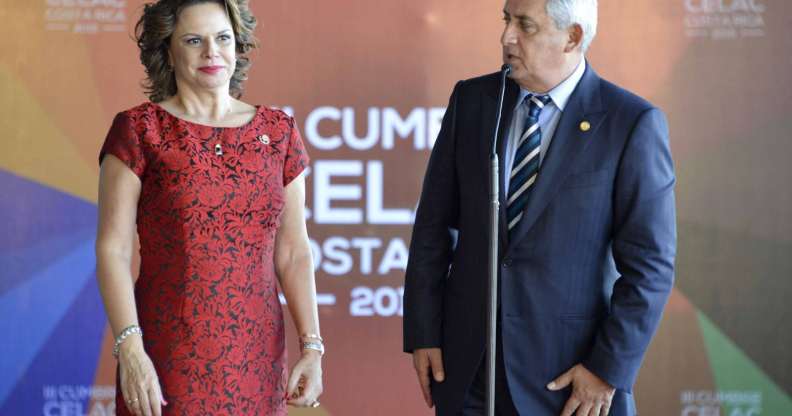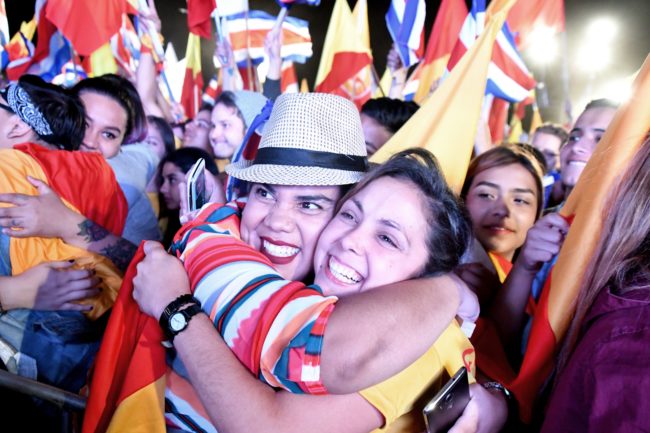Costa Rica gay marriage debate ‘hell’ for LGBT people, says former vice president

Venezuelan president Nicolas Maduro (R) and Ana Helena Chacon (L), Second Vice President of Costa Rica at the Santa Maria airport, 22 km north of San Jose, on January 28, 2015 (EZEQUIEL BECERRA/AFP/Getty)
Venezuelan president Nicolas Maduro (R) and Ana Helena Chacon (L), Second Vice President of Costa Rica at the Santa Maria airport, 22 km north of San Jose, on January 28, 2015 (EZEQUIEL BECERRA/AFP/Getty)
Costa Rica’s former vice president has spoken about the “horrible” division caused in the country during its recent election cycle, saying it became a vicious “referendum on gay rights.”
Costa Rica’s 2017-18 presidential election was thrown into disarray after the Inter-American Court of Human Rights (IACHR) ruled that human rights laws require the implementation of same-sex marriage.
In the wake of the ruling, fringe evangelical Fabricio Alvarado Muñoz emerged from sixth place to the frontrunner for president on the back of an aggressive anti-gay marriage campaign and a pledge to withdraw from the court. Subsequently, the election became predominantly defined by the issue of same-sex marriage.
The anti-gay candidate was eventually defeated by centrist Carlos Alvarado Quesada in the April 1 run-off, by a vote of 60.59 percent to 39.41 percent – but the country’s LGBT community says the divisive election fostered a surge in homophobic sentiment.

Costa Rican election results (Getty)
Speaking at The Economist‘s Pride and Prejudice conference on LGBT issues in London Thursday, former Costa Rican Vice President Ana Helena Chacón Echeverría said the divisions had been “hell.”
The politician, who left office in April, said: “We just went through elections in Costa Rica, and the country split in half. This was the issue. We weren’t talking about taxes or infrastructure or poverty, they were talking about gay rights, yes or no?
“It was like a referendum on gay rights. We went through torture during those months because, for the first time in my country, gay people were feeling fear. It was hateful.”
The former VP, a strong supporter of LGBT rights, was the person responsible for putting the marriage question to the IACHR for the first time in 2016 – leading to the landmark ruling.
She said: “We won in the end, and now all the countries that are part of the Inter-American Court have to adapt their laws for same-sex couple marriage and gender [recognition], and that’s a great thing.

“Now we’ll have to do some things to change our laws so that everybody will have the same rights.
“For me, it was wonderful news, but we went through hell during those elections… it was very sad for me.
“They were talking about morals, values, traditional families, ‘the family is just a mother and a father and the kids and the dog’… but we are all families.”
She added: “I believe in dignity, I believe people should be happy. We have to raise our voices because we don’t want anyone to live with discrimination or stigma.”
The politician opened up about other reforms she backed while vice president, including hospital visitation rights for same-sex spouses and non-discrimination laws.
Implementation of equal marriage in the country will rely on a ruling from its own constitutional court, which, in theory, should abide by the IACHR ruling alongside 16 other countries across the Americas.
Chacón Echeverría said: “We have to apply what the court said.
“Of course there will be other issues to discuss, like adoption. I’m pro-adoption for same-sex couples.”
She added that the country’s powerful Catholic Church “don’t like me very much,” adding: “I’m fighting for justice, to live in a less poor country, and for equality also.
“I don’t want to get involved in religion, I just want to get involved in embracing human rights.”

